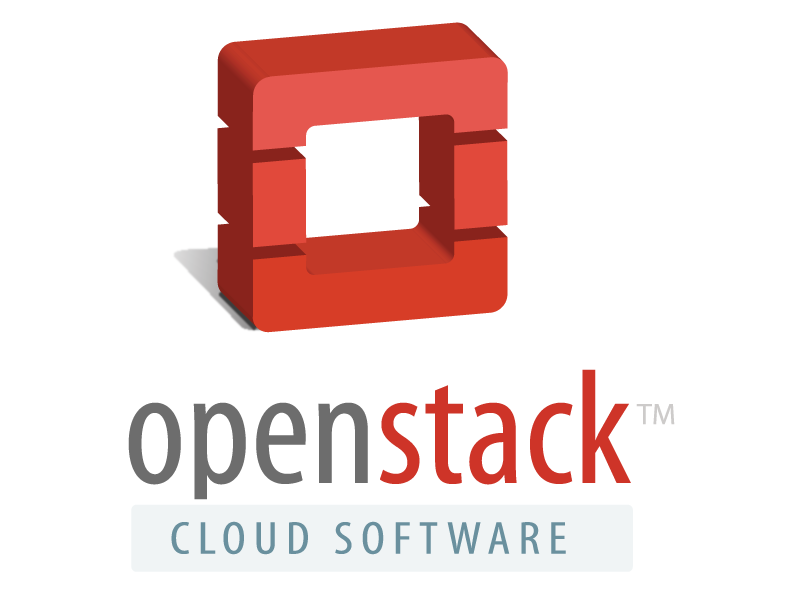Overview
- OpenStack Overview
- Dev Process Overview
- Devstack Install
Anti-overview
- In Depth OpenStack Tutorial
- Tutorial on chef/puppet/juju/cfengine/salt
- Endorsement of any of the above
- End-user Cloud Tutorial
Getting Started With Devstack
- devstack.org
- Annotated shell script which installs devstack in a VM
- NOT FOR PRODUCTION USE
- For developers to test stuff
Installing a Cloud using Devstack
- Get an Ubuntu Precise Server Image
Don't do this yet
sudo apt-get install git
git clone git://github.com/openstack-dev/devstack.git
cd devstack; ./stack.sh
Step One
- Get an Ubuntu Precise Image
NOT YOUR LAPTOP
NOT YOUR LAPTOP
NOT YOUR LAPTOP
Get devstack
git clone git://github.com/openstack-dev/devstack.git
cd devstack
# to run essex:
git checkout stable/essex
Customizing Devstack
FIXED_RANGE=10.1.0.0/24
FIXED_NETWORK_SIZE=256
Look in stackrc and stack.sh for other options
Fix Swap
sudo umount /mnt
sudo mkswap /dev/vdb
sudo swapon /dev/vdb
OpenStack Overview
- Software to run a cloud
- Made up of several (growing) projects
- Open Source
Projects
- keystone (identity service)
- nova (compute)
- glance (image service)
- swift (object storge)
- quantum (network service)
- cinder (volume)
- horizon (dashboard)
Libraries
- python-keystoneclient
- python-novaclient
- python-glanceclient
- python-swiftclient
- python-quantumclient
- python-cinderclient
- python-openstackclient
Tools
- tempest
- git-review
- devstack
- devstack-gate
- openstack.nose_plugin
- openstack-ci-puppet
- pbr
- zuul
Release Management
- Time Based Releases
- Six Month Cadence
- Design summits each cycle
- Continuously Open Trunk
- Develop directly on master
- One Month Milestone Releases
- Post-release Stable Branches
- Previous stable: diablo
- Current stable: essex
- Current devel: folsom
- Next devel: grizzly
Who is Running It?
- Rackspace
- Cloud Files == swift
- Cloud Servers (beta) == nova
- HP
- hpcloud in Private Beta (diablo)
- trystack (diablo)
- AT&T (diablo)
- Cern
- Mercado Libre
ALSO
- Cisco
- Citrix
- NTT
- Piston
- Nebula
- Nicira
- RedHat
- Canonical
Development Process Overview
- Highly Automated
- Developer Run
- Democratic Structure
- Virtual/Online
Vision
- Consistent Tooling
- Consistent Process
- Consistent Product
- Multiplier Effect
Consistent Tooling
- Minimize meta-development
- Process divergence == wasted developer time
- Lowers onboarding time
- Consolidate tool development
- Minimize project-specific weird build crud
Development Infrastructure Systems
Environment
- Ubuntu
- Python
- pep8 standards
- openstack.common
- virtualenv/pip/tox
- IRC (#openstack-dev, #openstack-meeting)
- devstack
- gated trunk based on master
Gated Trunk
- Ensures Code Quality
- Protects developers
- Devs always start from working code
- Protects tree
- Egalitarian
- Process is the same for everyone
- Process is transparent
- Process is automated
Everything Is Automated
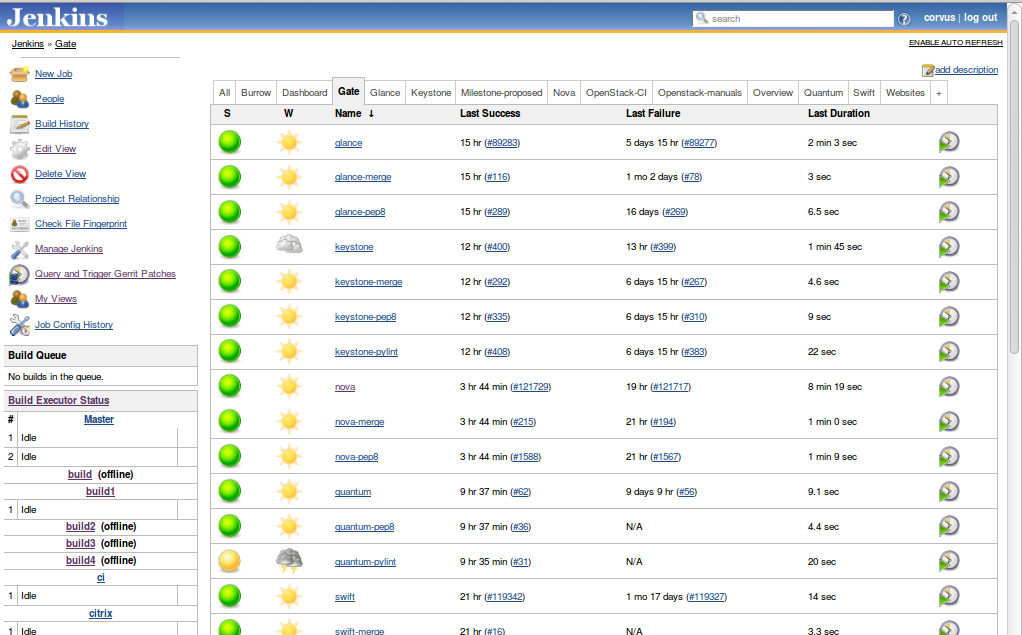
Process Flow
- Code is written and locally tested in a virtualenv
- Code is submitted for code review to gerrit
- Code is peer-reviewed
- Code is accepted or rejected by core team
- Code is run through pre-merge automated checks
- Code is merged or rejected
- Code is run through post-merge automated checks
Gerrit
- Developed by Google for Android
- Stand-alone patch review system
- Integration points: hooks, JSON queries, event-stream
- Extensible review categories, default: Verified, Code-Review
Pre-merge Check

Approved Reviews

Types of Jenkins Gerrit Triggers
- Patchset uploaded
- Change merged
- Comment added (review state)
OpenID SSO Integration
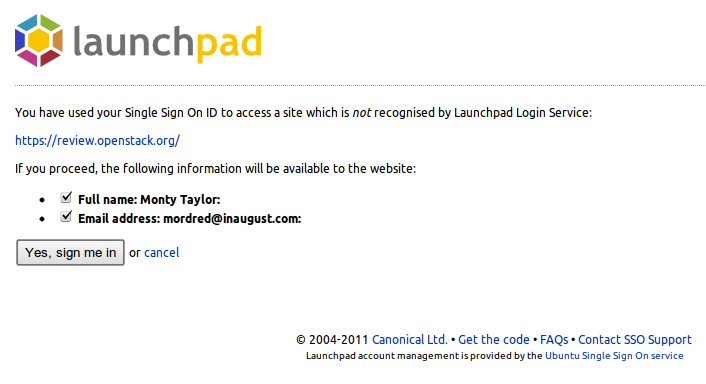
Bug Integration - Gerrit

Bug Integration - Launchpad
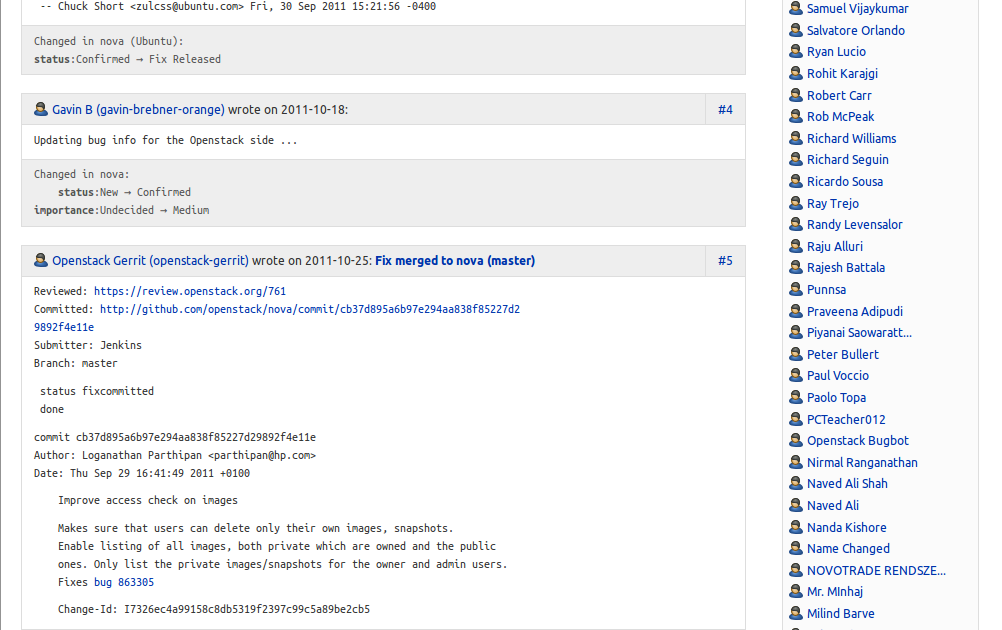
Blueprints - Gerrit

Blueprints - Launchpad
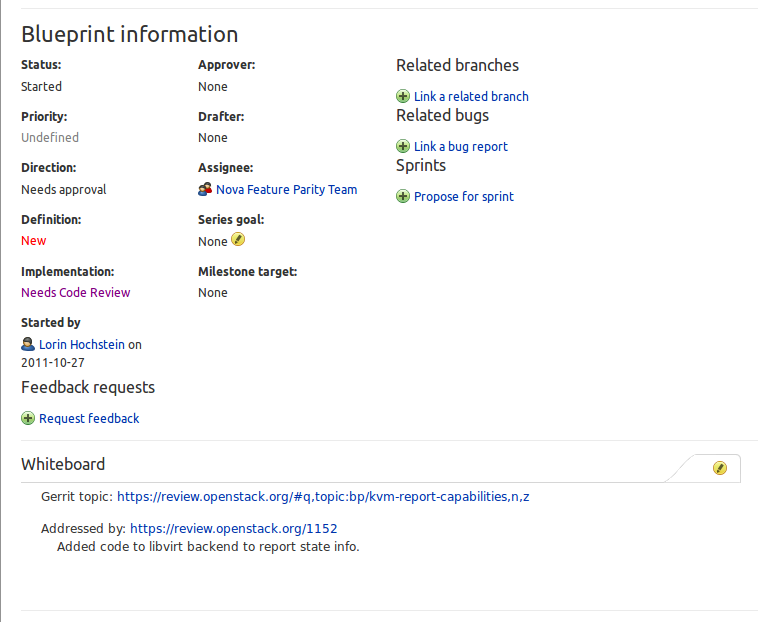
Blueprints - Gerrit Topics

Git Review
- External Git subcommand - pip/apt/yum
- Developers can easily incorporate code review into git workflow
- Zero-configuration
- Can be used for any project, being adopted by other projects
corvus@shiprock:~/rs/github/quantum$ git commit -a
[new-versionpy ddf1dce] Base version.py on glance.
3 files changed, 28 insertions(+), 107 deletions(-)
delete mode 100644 version.py
corvus@shiprock:~/rs/github/quantum$ git review
remote: Resolving deltas: 0% (0/3)
remote:
remote: New Changes:
remote: https://review.openstack.org/3072
remote:
To ssh://[email protected]:29418/openstack/quantum.git
* [new branch] HEAD -> refs/for/master/bug/916018
Types of Tests
- Unit tests
- Test the code of a single project
- Functional tests
- Can be run on real or virtual servers
- Test the service of a single project
- Easy for developers to run
- Integration tests
- May be able to run on virtual servers, should run on real servers
- Usually harder for a developer to run
Virtual Integration Tests
Devstack: https://github.com/openstack-dev/devstack
Easy for developers to recreate locally
On each commit:
- Provision Cloud Server (surprisingly HARD!)
- Run devstack to install code
- On success - delete server
- On failure:
- Keep Server
- Install developer's ssh key
- Give the server to the developer for 24H
Add your blog to OpenStack Planet
git clone git://github.com/openstack/openstack-planet.git
cd openstack-planet
# edit planet.ini
# add your image
git add images/yourusername.png
git add planet.ini
git commit
git review
tox
- Manages python virtualenvs
- Runs multiple python versions
Doing something more useful
git clone git://github.com/openstack/nova.git
# do things, now, to test it:
tox
# it's perfect - submit!
git commit
git review
Now We Have a Cloud!
- What are all of the different parts of it again?
Keystone
- Identity/Authentication Service
- Service Catalog
Keystone: Authentication
- Authentication
- Pluggable:
Keystone: Service Catalog
- curl
https://region-a.geo-1.identity.hpcloudsvc.com:35357/v2.0/tokens
"serviceCatalog": [
{
"name": "Identity",
"type": "identity",
"endpoints": [{
"publicURL": "https:\/\/region-a.geo-1.identity.hpcloudsvc.com:35357\/v2.0\/",
....
{
"name": "Image Management",
"type": "image",
"endpoints": [{
"tenantId": "74682717556353",
"publicURL": "https:\/\/glance2.uswest.hpcloud.net:9292\/v1.0",
Nova
- API
- Scheduler
- Compute
- Network
- Volume
- messaging RabbitMQ, zeroMQ
- database sqlalchemy: MySQL, PostGres, whatever
Nova Compute
- Compute Service
- Pluggable
- Virt Layer
- libvirt/kvm
- xen
- openvz
- hyperv
- baremetal
Nova Network
- Hard bit :)
- Provides/configures network to guests
- Quantum
- Floating IP Extension
Nova Volume
- LVM to iscsi mapping
- cinder
Glance
- Image Registry
- Image Store
Now What?
- sudo apt-get remove python-keyring
- Services running in screen rejoin-stack.sh
- Run tests exercise.sh
- Horizon running on port 80 on localhost
- devstack puts credentials in localrc, openrc does useful things. Get them with
source openrc
screen refresher
- C-a " windowlist
- C-a 0 select window 0
- C-a n next window
- C-a p previous window
Client Access
- pip install python-${PROJECT}client
- Environment:
- OS_USERNAME
- OS_PASSWORD
- OS_AUTH_URL
- OS_TENANT_NAME
- OS_REGION_NAME
debug info
export NOVACLIENT_DEBUG=1
Images in Glance
glance image-list
Save the UUID you want in a var called IMAGE_ID
Security Groups (extension)
- Control what ports are open
SECGROUP=test_secgroup
nova secgroup-create $SECGROUP "$SECGROUP description"
nova secgroup-add-rule $SECGROUP icmp -1 -1 0.0.0.0/0
nova secgroup-add-rule $SECGROUP tcp 22 22 0.0.0.0/0
Keypairs (extension)
- ssh credentials for logging in
KEY_NAME=test2_key
KEY_FILE=key.pem
nova keypair-add $KEY_NAME > $KEY_FILE
Flavors
nova flavor-list
+----+-----------+-----------+------+-----------+------+-------+-------------+
| ID | Name | Memory_MB | Disk | Ephemeral | Swap | VCPUs | RXTX_Factor |
+----+-----------+-----------+------+-----------+------+-------+-------------+
| 1 | m1.tiny | 512 | 0 | 0 | | 1 | 1.0 |
| 2 | m1.small | 2048 | 10 | 20 | | 1 | 1.0 |
| 3 | m1.medium | 4096 | 10 | 40 | | 2 | 1.0 |
| 4 | m1.large | 8192 | 10 | 80 | | 4 | 1.0 |
| 5 | m1.xlarge | 16384 | 10 | 160 | | 8 | 1.0 |
+----+-----------+-----------+------+-----------+------+-------+-------------+
Save the flavor id as FLAVOR_ID
Add an IP
nova floating-ip-create
nova floating-ip-list
nova add-floating-ip $VM_UUID $FLOATING_IP
Volumes
DEVICE=/dev/vdb
VOL_NAME=test_volume
nova volume-create --display_name=$VOL_NAME 1
nova volume-list
nova volume-attach $INSTANCE_NAME $VOLUME_ID $DEVICE
Hacking Code
- Repos in /opt/stack
- Installed via python setup.py develop
Simulated Production
Great! Now how about a real deployment
Bare Metal Process
Each test:
- PXE boot
- Install Ubuntu
- Install OpenStack
- Run test suite
Test Process Improved
One time (Orchestra driven):
- PXE boot
- Install Ubuntu
- Install OpenStack dependencies
- Snapshot LVM volume
Each test:
- Kexec boot into LVM snapshot
- Install OpenStack
- Run test suite
Cobbler
- Written by RedHat
- PXE/net-install
- Pluggable power management support (impi, drac, ilo ...)
- Manage dns/dhcp/tftp - or use others
- Templated kickstart or preseed files
Ubuntu Orchestra
- cobbler
- squid
- dnsmasq
- nagios
- rsyslog
- cloud-init
Walkthrough
- https://github.com/openstack/openstack-ci-puppet
- https://github.com/openstack/openstack-ci-puppet/tree/master/modules/orchestra
Install Orchestra
- apt-get install ubuntu-orchestra-server ipmitool
- (install will download ubuntu install images and import them)
Configure dnsmasq
- Edit dhcp options in /etc/cobbler/dnsmasq.template
- Add "dhcp-ignore=tag:!known"
- Insert network range
Cloud Init Script
- Ubuntu Orchestra pre-seed files
- In the preseed/late_command, use snippets
- Run a cloud-init script to bootstrap puppet or chef
Add Profile
cobbler profile add \
--name=natty-x86_64-ostest \
--parent=natty-x86_64 \
--kickstart=/var/lib/cobbler/kickstarts/openstack.preseed \
--kopts="priority=critical locale=en_US"
Add machines manually
For each machine
cobbler system add \
--name=baremetal1 \
--hostname=baremetal1 \
--profile=natty-x86_64-ostest \
--mac=00:11:22:33:44:55 \
--power-type=ipmitool \
--power-user=IPMI_USERNAME \
--power-pass=IPMI_PASS \
--power-address=IPMI_IP_ADDR \
--ip-address=SYSTEM_IP_ADDRESS \
--subnet=SYSTEM_SUBNET \
--kopts="netcfg/choose_interface=auto netcfg/dhcp_timeout=60 auto=true
priority=critical"
Adding systems automatically
cobbler-enlist
d-i preseed/early_command string anna-install cobbler-enlist-udeb
d-i cobbler-enlist/cobbler-server-address http://IP/cobbler_api
d-i cobbler-enlist/cobbler-server-username cobbler
d-i cobbler-enlist/cobbler-server-password password
d-i cobbler-enlist/host-name some-host
d-i cobbler-enlist/host-profile
d-i cobbler-enlist/warning-note note
Reinstall a machine
cobbler sync
cobbler system edit --netboot-enabled=Y --name=baremetal1
cobbler system reboot --name=baremetal1
Thanks!
Slides are available at https://github.com/openstack-ci/publications in the
tutorial folder.













